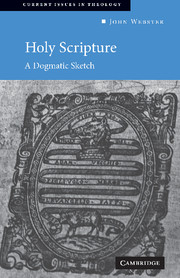3 - Reading in the economy of grace
Published online by Cambridge University Press: 05 June 2012
Summary
There is a certain intellectual dignity and stateliness to the theological concepts which we have been exploring so far. But their appeal is also spiritual. Revelation, sanctification, inspiration, canon cannot be fittingly handled as just so much dogmatic apparatus; understanding them is inseparable from their Christian deployment. We may, therefore, begin with a statement from one of the old Lutheran divines on the ‘use’ of the article on Scripture:
This article is to be used in the following manner: We are to recognize and accept without reservation the holy Scripture … as the Word of Almighty God, and we are to regard and cherish it as the most precious of treasures … We are devoutly to give audience to God speaking in the Word, we are to reflect upon His Word day and night and we are to explore it with true piety and utmost devotion … We are to turn neither to the right nor to the left from Scripture, nor are we to suffer ourselves to be moved to the slightest degree by the solicitation of others or the desires of our own flesh, lest in some way we introduce something in doctrine or life which is contrary to better knowledge or against our conscience … We are to gain comfort from them alone in every necessity of body and soul, and through patient consolation of the Scriptures have a sure hope of life and remain steadfast to the end of life.
- Type
- Chapter
- Information
- Holy ScriptureA Dogmatic Sketch, pp. 68 - 106Publisher: Cambridge University PressPrint publication year: 2003



